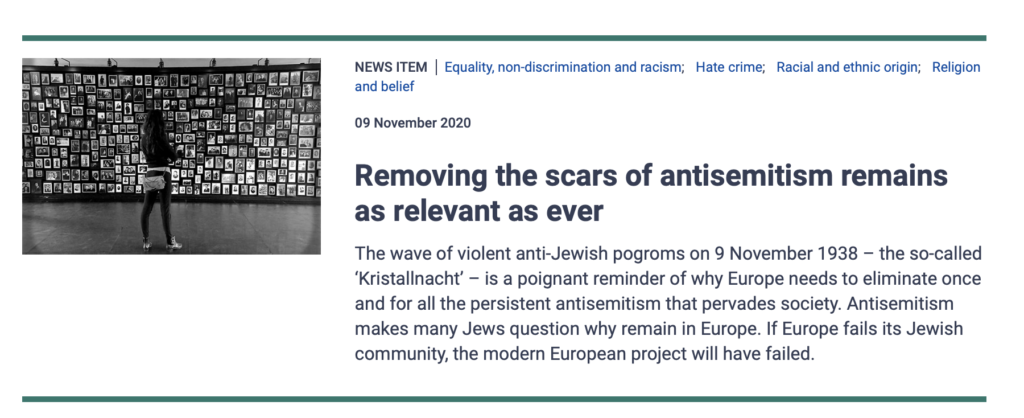Night of Broken Glass / Kristallnacht 2020
‘Men are accomplices to that which leaves them indifferent. George Steiner (1929-2020)
‘This year 2020, we remember one of the worst episodes of human rights violations in history: the dehumanisation, deportation and killing of millions of people, including Jews, Roma/ Sinti, gay people and resistance fighters. We should also remember at this time the many people with mental health and other disabilities who were murdered as part of the Nazi euthanasia programme, and the involvement of professionals including doctors and nurses; and that psychological ideas about eugenics played a significant role in its justification. The psychological consequences, in the form of massive traumata, are still felt in today generations of victims and survivors.
The profession of psychology can draw ethical lessons from the professional involvement of doctors in the so-called T-4 programme. By their knowledge and skills, psychologists can and should contribute to a more peaceful and humane society, to trauma treatment and the prevention of exclusion. A human rights based-and-oriented psychology is more than ever needed.’ (EFPA Newsletter 2, February 2020)
On this Monday November 9, we commemorate the Night of the Broken Glass –Kristallnacht-. On the night of November 9–10, 1938 German Nazis attacked Jewish persons and property. The name Kristallnacht refers ironically to the litter of broken glass left in the streets after these progroms.
Hans Keilson, Jewish-German-Dutch psychiatrist wrote in his book Der Tod des Widersachers (The death of the adversary) about the struggle to step out of the ‘community of adversaries’, of the paradox of being opponents and co-humans at the same time. The important message is to see the connection between our anxieties and our image of the enemy, he argues.
Today, dehumanisation and exclusion is still taking place. Denial is beginning of racism; and as the most of us are bystanders, active bystandership and moral courage, in the sense of Ervin Staub is needed. As citizens and as psychologists, we can and should stand up for human rights and use our knowledge and experience for a better world.
Polli Hagenaars, GNPHR Steering Committee
European Fundamental Rights Agency
 Read more: https://fra.europa.eu/en/news/2020/removing-scars-antisemitism-remains-relevant-ever
Read more: https://fra.europa.eu/en/news/2020/removing-scars-antisemitism-remains-relevant-ever

